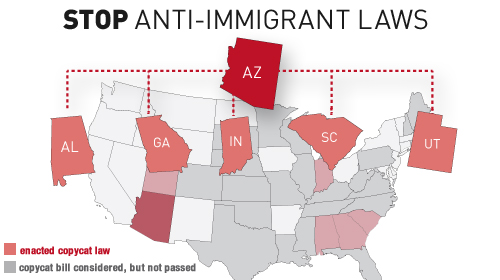
At the end of today's Senate Judiciary Immigration Subcommittee hearing on state and local immigration enforcement (ACLU statement here), former Arizona State Senate President Russell Pearce tried to explain why Arizona's racial profiling law, S.B. 1070, makes sense. He proposed a logical two-step (watch from 120:45 here): First, he asserted that 90 percent of those who violate our immigration laws "come across that Southern border," and are "Hispanic." (In fact, 77 percent of the undocumented population is Latino.)
Then, continuing his train of thought, Pearce illustrated by analogy why S.B. 1070's "show me your papers" rules are "common sense": "If I've got three kids in Sun City at 3 in the morning, I don't care what color they are, they're going to get stopped and questioned: kids don't live in Sun City [a retirement community] and 3 o'clock in the morning's another element." That's S.B. 1070 in a nutshell: Pearce thinks kids and late nights are proper factors for police to take into account for "reasonable suspicion" in Sun City, so Latino heritage and how undocumented people supposedly dress, a factor Pearce defended in the hearing, become legitimate bases for "show me your papers" checks.
Pearce denies any problems with the law, part of which the Supreme Court will consider tomorrow. He wants everyone to be confident that police play by the rules: "If it's not reasonable they won't ask." Indeed, Pearce styles himself a "civil libertarian." But there are too many real-life examples of racial profiling by police in the six states with anti-immigrant racial profiling laws — Arizona, Alabama, Georgia, Indiana, South Carolina, and Utah — to dismiss them as pesky "little anecdotal things that we pick out [to show] a victim," in Pearce's words.
Arizona State Senator Steve Gallardo spoke of Julio Mora, a U.S. citizen born in Arizona. In 2009, Mora and his father (a 30-year lawful permanent resident) were going to work when they were surrounded by two Maricopa County Sheriff's Office vehicles, and ordered out of their truck. They were frisked, handcuffed and taken to Mora's workplace — where an MCSO immigration raid was in progress. Mora recalled: "Maybe it was because of the Campesina radio station sticker on our bumper or . . . because my dad was wearing his Mexican tejana [hat] and they thought we were illegal. But they never bothered to ask us." Last year, Maricopa County agreed to pay $200,000 in settling the Moras' lawsuit for this incident.
Jim Shee, a U.S. citizen plaintiff in ACLU's litigation against S.B. 1070 who has also been racially profiled in Arizona, notes that "[m]y grandchildren are not blonde hair, blue eyes, and I fear for them that they are going to have to probably produce paperwork that they are here, what is their immigration status . . . . I feel that's very degrading and embarrassing."
San Francisco District Attorney George Gascón served in leadership positions in the Los Angeles, Mesa, Arizona and San Francisco police departments. He emphasizes that "[a]n officer motivated by race or ethnicity can easily find a valid pretext . . . by following a car until a minor traffic violation occurs." Gascón believes that state immigration enforcement laws "cannot be enforced in a race-neutral manner. When police officers [inquire into] immigration status . . . they will inevitably rely upon race and ethnicity as factors in establishing reasonable suspicion."
Today, by contrast, Russell Pearce lavished praise on "Sheriff Joe Arpaio, who is keeping his Oath and doing the job he was hired to do. . . . yet the Obama Justice Department continues to attack and threaten him." The ACLU and its allies are suing MCSO for racial profiling of Latinos, and illegal stops and seizures. The Department of Justice recently concluded that MCSO "engaged in a widespread pattern or practice of law enforcement and jail activities that discriminate against Latinos. This discrimination flows directly from a culture of bias and institutional deficiencies that result in the discriminatory treatment of Latinos." S.B. 1070 would encourage other agencies to adopt MCSO's tactics and would be invoked by MSCO officers as justifying their egregious behavior, while simultaneously discouraging trust in law enforcement by victims and witnesses of crime.
Thankfully, the national tide is turning. State legislatures increasingly recognize that such laws are bad for their economies, public safety and civil rights. After the first wave of six laws, similar proposals have been consistently rejected. As Mississippi's agricultural associations recently urged their elected officials, "[w]e should learn from [prior] mistakes and avoid them."
Learn more about racial profiling: Sign up for breaking news alerts, follow us on Twitter, and like us on Facebook.



